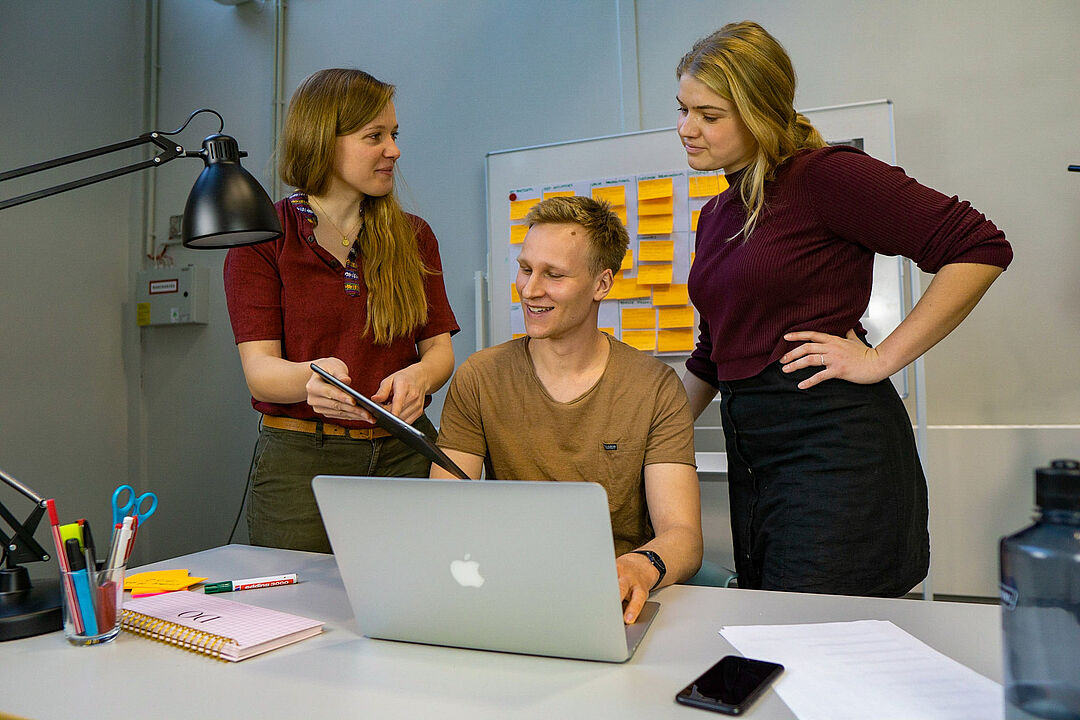TU Start-up codary offers teenagers programming classes
In schools across Germany, students learn a whole array of signs and languages that will accompany them throughout their lives. They learn letters, numbers, foreign languages, and in some cases musical notation too, even if this is only remembered for a short while. However most do not learn the languages behind every digital application despite their ubiquitous nature: programming languages. Only a few federal states have made computer science a compulsory subject in school. “Students who want to learn to code often do not have the opportunity to do so in school. Those who are really interested end up having to teach themselves. We didn’t have this kind of opportunity either while in school and are all self-taught. We want to change this,” says TU alumna Antonia Schein, who founded codary together with fellow alumna Amanda Maiwald and Nikolaj Brewer to close this gap. Through their company, the three founders aim to teach kids and teens how to code.
Digital coding classes via video chat
“We offer digital coding classes via video chat. Our programming course is designed to mimic the computer game Minecraft, incorporating play into the lessons. Every kid is familiar with Minecraft. In the future we will also offer classes on how to write an app or program a LEGO robot,” explains Schein. In one codary course, kids aged between 12 and 18 learn Python over a span of 12 weeks. According to the codary team, Python is both a popular programming language and easy to learn. It is also used in a number of fields such as data analysis or machine learning. “Our students learn how to build complex objects in Minecraft or create their own small Minecraft games,” says Schein. “Students throughout Germany attend a digital lesson once a week in groups of no more than 10 taught by experienced coaches. The age difference isn’t an issue; they are all learning a language and twelve-year-olds have just as good an understanding as older students. Previous knowledge isn’t needed.”
Analyzing social media with Python
Another course focuses on popular social media channels. Here students learn how to use Python to access and analyze social media data, such as that on Instagram or Twitter. The kids learn to export pictures, likes or tweets and what exactly is possible with all this data. The class also explores critical issues such as data privacy, the private sphere, and the business models of these platform providers.
“The market for learning programming languages is still quite modest. Many offers are in English and there are several non-profit ones as well. Oftentimes, though, these are one-off workshops where you don't get the chance to consolidate through regular attendance,” Schein continues. “We are currently running ads for our courses on every possible channel. However, it is important that we convince not only kids but also parents of the value of our service! We’ve admittedly benefited from the many online meetings everyone has had during the past year. It’s become normal to meet and learn digitally. This means our teaching format is a bit more familiar to people than it otherwise would have been a year ago,” she reflects.
Funding from the Berlin Startup-Stipendium
The codary team first began work in October 2020. “We applied for a Berlin Startup-Stipendium. Once we had been selected, everything moved very quickly. We all left our jobs at the time and set to work,” says Schein. The Berlin Startup-Stipendium funds each founder with 2,000 euros per month for a maximum of one year. The scholarship is awarded to promising start-up ideas with a focus on technology. The team also receives support from TU Berlin’s Centre for Entrepreneurship, which provides them not only with regular trainings and coaching but also an office in the University’s EINS co-working space on Ernst-Reuter-Platz.
The three founders have already enjoyed their first success: They were recently awarded first place in the category “BPW Plan” during the first round of BPW, the Berlin and Brandenburg regional business plan competition.


![TU Start-up codary: Amanda Maiwald and her colleagues offer coding classes via video chat. [Translate to English:] TU-Start-up codary: Amanda Maiwald ist in einer Video-Konferenz auf einem Laptop-Bildschirm zu sehen.](https://www.static.tu.berlin/fileadmin/www/_processed_/8/c/csm_codary_Coach_erklaert_3e9c2faaa1.png)
![An online meeting with codary in the University's EINS co-working space. The start-up's offices are also located here. [Translate to English:] Ein Online-Meeting mit dem TU-Start-up codary im Co-Workingspace EINS der TU Berlin](https://www.static.tu.berlin/fileadmin/www/_processed_/8/1/csm_Teilnehmer_406ea0ae8d.jpg)